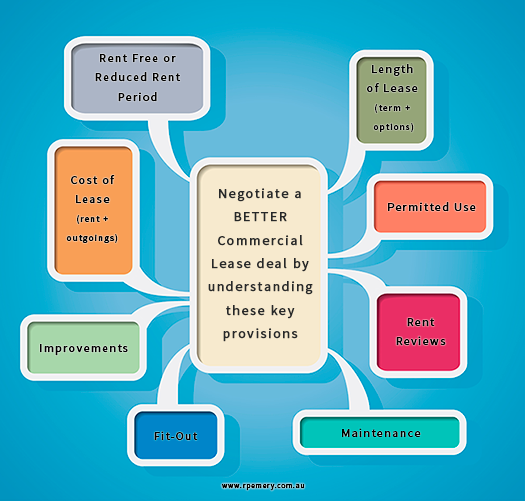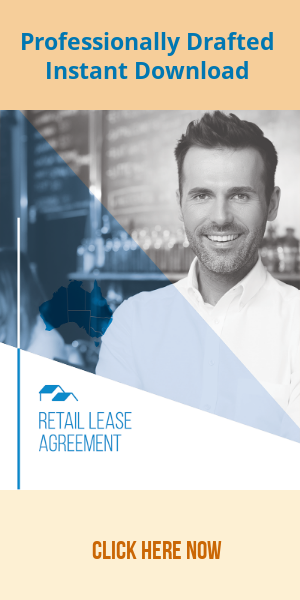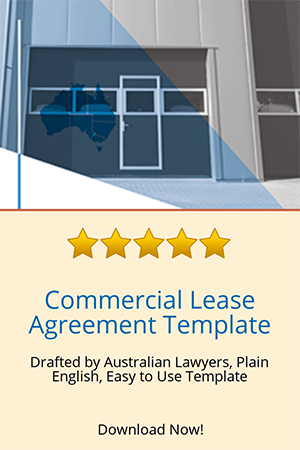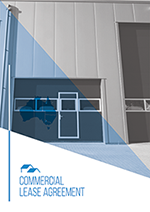If you find yourself negotiating a commercial lease for the first time, being familiar with these key lease issues will help you strike a better deal.

Rent free /reduced rent period
Often a landlord will offer incentives to lock in a high-quality tenant. Sometimes the incentives are tied to longer lease periods, to afford the landlord the security of rental return.
Even if your potential landlord isn’t offering incentives straight up, don’t let this stop you from asking. Try to negotiate a rent free period (say three months’ rent free) or a percentage off the annual cost for the first year (for example, 20% reduced rent).
Fit-out
You know the work required to customise the premises for the specific requirements of your business, so make sure you get the  landlord’s approval to undertake these works before you sign the lease. You should also seek access to the premises before you start paying rent to undertake your fit-out works.
landlord’s approval to undertake these works before you sign the lease. You should also seek access to the premises before you start paying rent to undertake your fit-out works.
If the landlord has agreed to undertake certain fit-out works to the premises (painting, electrical, lighting, installation, etc.), make sure you record the works in the lease.
Most Australian retail lease legislation states that a tenant does not need to start paying rent until the landlord has substantially complied with its fit-out requirements.
Permitted use
How do you intend to use the premises? Most leases have a ‘permitted use’ clause that restricts the tenants’ use of the premises to the permitted use only.
Get approval from the landlord up-front for your permitted use and while you are at it, try to negotiate as wide a scope of the permitted use as possible. For example, instead of a very restricted definition of ‘manufacture of light bulbs’, why not: ‘manufacture of goods’, or ‘any use allowed by law’.
A widely defined permitted use clause:-
- enables you to expand your business activities; and
- makes it easier to assign or sub-let the premises in the future.
The assignee or sub-tenant also needs to act within the scope of the permitted use specified in the lease unless the landlord agrees otherwise.
Length of the lease
If you are setting up a new business, think about negotiating a short lease term rather than locking yourself into a long lease.
You can negotiate options, which give you the right to extend the lease after the initial lease term expires.
Taking up the option is ideal if things are going well for your business, but at the same time, you are not locked into taking up the option if the venture is failing.
An example might be an initial term of one year, with five one-year options after the initial one-year term expires, or an initial three year term with three options to renew.
Cost of the lease
If the rent is calculated as an amount per square metre, you should double check the area of the rented premises and the calculations.
Remember, the cost of the lease is not just the starting base rental amount. Check for costs that are hiding in the fine print, such as
- outgoings,
- maintenance,
- local government rates and charges,
- taxes,
- security fees,
- cleaning, water charges,

- sewerage and drainage rates,
- insurance,
- management fees,
- legal fees,
- electricity,
- garbage removal,
- air conditioning,
- common area maintenance fees, etc.
Some landlords choose not to charge extra for outgoings, but rather incorporate all associated costs and charges into the base rent amount.
Increases in the cost of the lease over time
Rent reviews (or rent increases) during the term of your lease can strain your budget.
Common rent review methods include:
- Movements in CPI;
- A fixed percentage (eg. 3%); or
- A fixed amount (e.g., $100).
The frequency of increases will vary too. Your lease might stipulate that the rent will be reviewed six monthly, annually, or every three years. While a 3% increase every three years may be acceptable to you, it may be excessive if it applies every six months.
It is worthwhile to calculate the cost of the rent in real dollar values over the term of the lease. By doing so, you will get an accurate picture of what the lease will cost in year 1, year 2, year 3 and so on.
The cost of the lease in the third year might be vastly different to the cost in first – particularly if you enjoyed lease incentives.
Don’t be afraid to negotiate if you feel the rent increase provisions to be out of your budget or excessive.
Options to renew the lease
It can be devastating to spend considerable time and money cultivating a business presence at the location of your rented premises, only to find out the lease has ended, and the landlord requires you to move out.
You don’t want to find yourself on the street before having time to recoup the money you’ve outlaid to fit-out the premises and set up your business.
Make sure that you have a sufficient lease ‘term’ and options to renew the lease, once the initial term has expired, should you choose to stay on.
For example, you might have a five-year initial lease term with five options to renew, each for an additional five-year period. In this case, you would effectively have the right to lease the premises for 30 years, should you wish to do so.
Each situation is different and what suits one business may not suit another – so think about what’s right for you.
Maintaining the premises
Does the lease require you to undertake or contribute towards maintaining the premises? Maintenance tasks can include duties such as painting every five years, garden maintenance, or regular updates to the fit out, etc.
Make sure the landlords’ requirements in this regard are fair and within reason – not to mention within your budget!
Assigning or subletting
Don’t get stuck with a lease that you can’t assign or sublet if your circumstances change.
Assigning your lease allows you to sign it over to someone else, for example if you sell your business.
Subletting the whole or part of your premises is different. You are still responsible under your lease to the landlord but have a separate contract with a sub-tenant, who agrees to pay you rent.
You can sublet part of the premises if you are not using the whole space (for example, in times of economic downturn) or you can sublet the whole of the premises (for example, if your business has grown forcing you to move on to a bigger location).
Generally speaking, assigning or subletting is a means for you to exit the lease arrangement should your circumstances require.
A standard provision allows you to assign or sublet with the landlord’s consent but prevents the landlord from withholding their consent unreasonably. An acceptable reason for the landlord withholding consent may be if the proposed new tenant or sub-tenant does not have viable business experience or cash back-up.
Improvements to the premises
Make sure you can make alterations to the premises with the landlord’s consent. You should make sure that the lease stipulates that the landlord cannot unreasonably withhold their consent to any requested improvements that you may need to make to the premises.
As they say, knowledge is power, so going into your lease negotiations primed with the facts will allow you to hash out a deal that will suit your budget and circumstances.
Need more information
Commercial Lease Agreement Template Kits for Each Australian State
 This easy-to-use template kit contains everything you need to successfully lease your commercial premises. It contains the commercial Lease Agreement Template, Easy-to-follow Users Guide and Agreement to Lease
This easy-to-use template kit contains everything you need to successfully lease your commercial premises. It contains the commercial Lease Agreement Template, Easy-to-follow Users Guide and Agreement to Lease
Retail Lease Agreement Template kits for every Australian State
Our Retail Lease Agreement kit contains everything you need to lease your shop. It includes a professionally drafted retail lease Agreement and Disclosure statement, a sample disclosure statement and Retail lease plus easy to follow help guide and getting started document.
NEW – State Based Real Estate Property Kit
 It’s taken several years to get all the documents together but we’ve finally done it. We’ve just launched our Property Investors Kit with a view to providing all of the documents you would need if you were prone to property investment.
It’s taken several years to get all the documents together but we’ve finally done it. We’ve just launched our Property Investors Kit with a view to providing all of the documents you would need if you were prone to property investment.
How to do bankruptcy and company searches for commercial transactions
 In business, it is prudent to conduct targeted enquiries such as bankruptcy and company searches on the parties you are considering dealing with so you can make sure you are not exposing yourself to unnecessary risk.
In business, it is prudent to conduct targeted enquiries such as bankruptcy and company searches on the parties you are considering dealing with so you can make sure you are not exposing yourself to unnecessary risk.
Info graphic – Expenses you can claim for your Commercial Rental Property
 If you own a Commercial rental Property you can claim the following list of expenses as a tax deduction as long as the expenses were incurred during the period your property was rented or available for rent.
If you own a Commercial rental Property you can claim the following list of expenses as a tax deduction as long as the expenses were incurred during the period your property was rented or available for rent.


